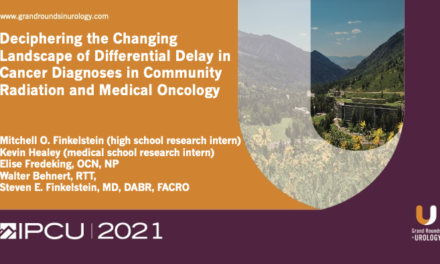Neal D. Shore, MD, presented “The Gold Standard for Bladder Cancer Detection” during the 3rd Annual International Bladder Cancer Update on January 23, 2019 in Beaver Creek, Colorado.
How to cite: Shore, Neal D. “The Gold Standard for Bladder Cancer Detection” January 23, 2019. Accessed May 2025. https://grandroundsinurology.com/the-gold-standard-for-bladder-cancer-detection/
The Gold Standard for Bladder Cancer Detection- Summary:
Neal D. Shore, MD, discusses the benefits of using blue light cystoscopy (BLC) in adjunct with white light cystoscopy (WLC) in the diagnosis and treatment of bladder cancers. He then reviews the body of evidence evaluating the accuracy of BLC in detecting significant tumors and briefly compares BLC and narrow band imaging.
Abstract:
While white light cystoscopy (WLC) is the gold standard for bladder cancer detection, there is room for improvement with this technique. Due to the chronic nature of the disease, bladder cancer is very expensive to manage. Surveillance and recurrence costs account for the majority of this economic burden. Improving imaging techniques can help alleviate this issue, as well as improve patient care.
Blue light cystoscopy (BLC) can augment the use of WLC to improve both the detection and resection of bladder cancers. BLC is an optical imaging agent and supplement to WLC that involves the insertion of a photosensitizer into the bladder. Under blue light illumination, abnormal cells fluoresce red, enabling the detection of cancer cells not visible in white light settings.
Notably, BLC can specifically produce defined visualizations of carcinoma in situ (CIS), papillary tumors, small lesions, and, conceivably, large tumors around the margins of the bladder.
The body of clinical evidence evaluating BLC shows a pronounced difference between visualizations made solely with WLC, and those made with WLC paired with BLC. In a phase III, comparative, multicenter study, BLC significantly improved detection of reccurent bladder cancer in 20.6% of patients, and of CIS in 34.6% of patients. In another prospective, randomized study, BLC detected Ta/T1 tumors in 16.4% of patients and CIS in 46% of patients that WLC did not.
BLC is the standard of care throughout most of Europe. Comparatively, the mainstream urologic community in the United States does not use BLC as widely. This is because of reimbursement issues and costs associated with the purchase of needed equipment. In the future, additional related studies are necessary to investigate BLC in the context of disease progression and patient survival.
About the International Bladder Cancer Update
The International Bladder Cancer Update (IBCU) is an annual one-day CME conference focused on bladder cancer treatment updates. IBCU takes place during its sister conference, the International Prostate Cancer Update (IPCU). The conference’s faculty consists of international experts, and the event caters to urologists, urologic oncologists, and other healthcare professionals. In addition to didactic lectures, IBCU features interactive discussions, a panel roundtable, debates, and case presentations. Dr. Shore presented this lecture during the 3rd IBCU in 2019. Please visit this page in order to learn more about future IBCU meetings.
ABOUT THE AUTHOR
Neal D. Shore, MD, FACS, graduated from Duke University and Duke University Medical School. He completed his general surgery/urology residency at New York Hospital-Cornell Medical Center/Memorial Sloan Kettering Cancer Center. He serves as the Medical Director for the Carolina Urologic Research Center and is the Chief Medical Officer, Strategic Growth and Pharmacy, GenesisCare, US.
Dr. Shore has conducted more than 400 clinical trials, focusing mainly on genitourinary oncology, and has authored or coauthored more than 350 peer-reviewed publications and numerous book chapters. He serves on the Society for Immunotherapy of Cancer (SITC) Guidelines Committee for Bladder Cancer, as well as the boards of the Bladder Cancer Advocacy Network, Maple Tree Alliance, and the Duke Global Health Institute. He is the Chair of both the Prostate Cancer Academy and the Bladder/Kidney Cancer Academy for the Large Urology Group Practice Association (LUGPA) Specialty Network. He also co-chairs the annual AUA International Prostate Forum. He has served/serves on the editorial boards of Reviews in Urology, Urology Times, Chemotherapy Advisor, OncLive, PLOS ONE, Urology Practice, JUOP and World Journal of Urology, and he also serves as an editor of Everyday Urology-Oncology. He is a Fellow of the American College of Surgeons.



